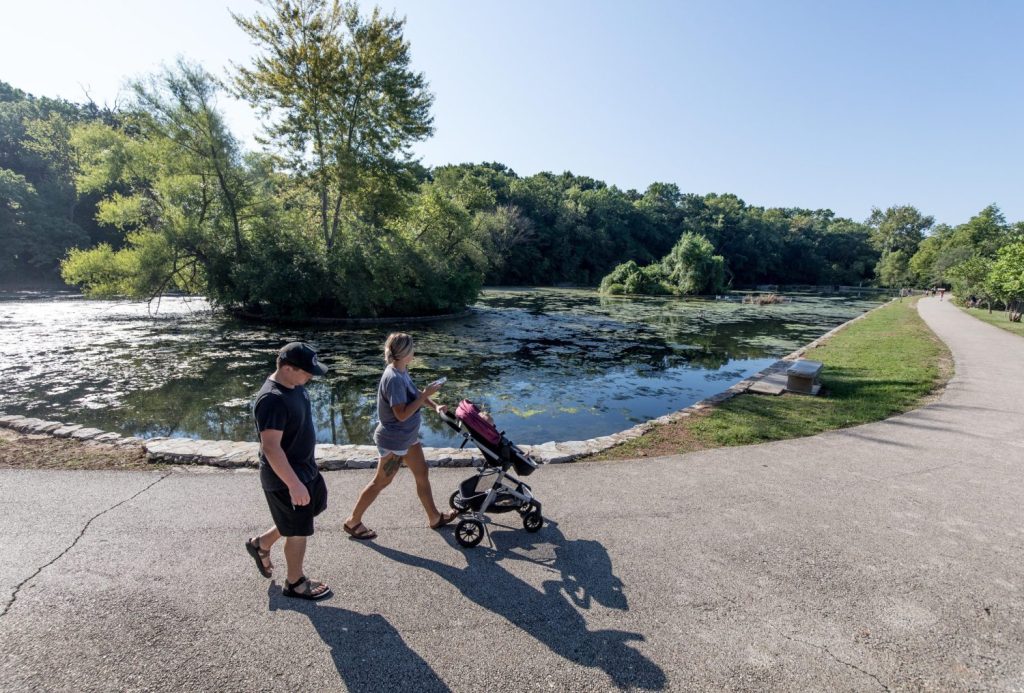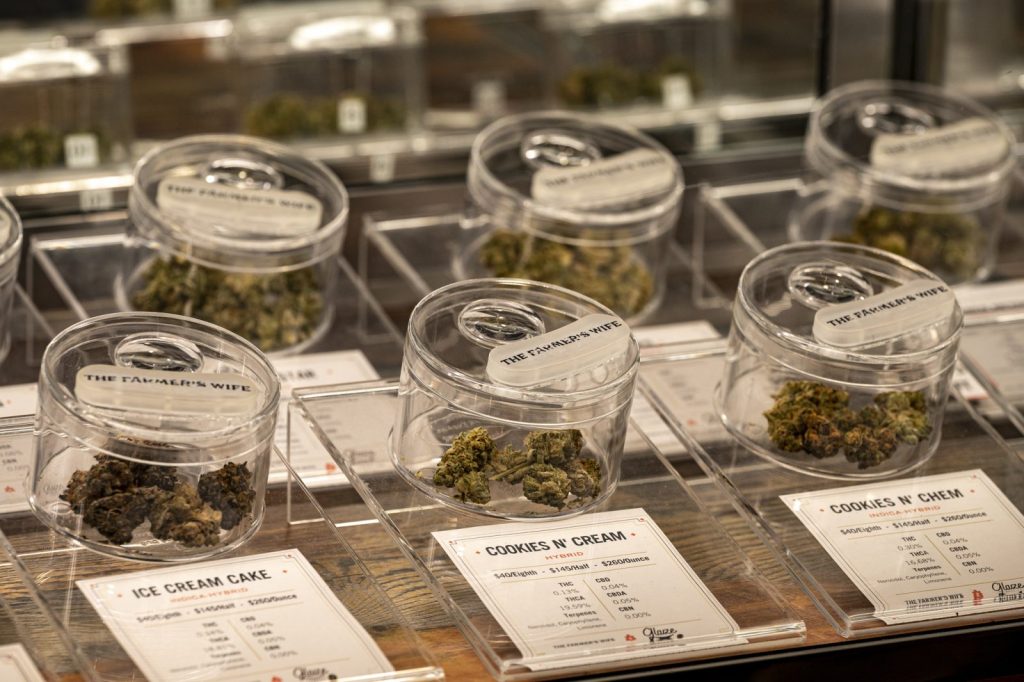It’s legal to have and use marijuana in Missouri, but the Springfield City Council is left wrestling with how to keep marijuana out of certain public places.
An ordinance regulating the use of marijuana — in many forms — is likely to go up for discussion and a Springfield City Council vote in the near future.
Missouri Constitutional Amendment 3 and the fallout from its passage by voters in November 2022 has been the subject of two lengthy Springfield City Council meetings this year. The City Council debated if additional regulations on dispensaries were needed, then discussed how laws to limit smoking in public, intoxication and drug possession will impact Springfieldians who use marijuana.
City Councilman Craig Hosmer is worried about the possible impacts legalized marijuana could have on Springfield, especially in public gathering spaces.
“This is sort of an experiment; we don’t know what the exact impact is going to be,” Hosmer said.
Hosmer said it’s possible to loosen restrictions on marijuana use and consumption in the future, but it will be far more difficult to tighten restrictions in response to any problems that could result from marijuana possession or consumption on Springfield’s streets and parks.
“I think it’s a bad idea for our parks,” Hosmer said. “I would encourage us to look at making consumption of marijuana in public places not permitted.”
Marijuana would be included in public smoking ban
Assistant City Attorney Mary Bozarth spoke to the Springfield-Greene County Health Department’s concerns related to recreational marijuana possession and use. Bozarth said there are actions local governments can take to keep people from smoking marijuana in certain places.
“Suffice it to say, the city of Springfield is able to legislate public use under the auspices of Amendment 3,” Bozarth said. “It’s really just that we are capped at the fine, it can’t be more than a $100 fine with regulating public use.”
The Springfield-Greene County Health Department advised against making any new laws specific to smoking marijuana in public places, and that’s largely because smoking anything derived from a plant in enclosed public places is already illegal, and has been since Springfield adopted the Smokefree Air Act of 2011.
The City Council also looked into regulating consumption of marijuana-infused products, which could include foods and drinks at restaurants. Under state law, a restaurant would not qualify as a licensed marijuana dispensary. Therefore, Bozarth said it’s not legal under state or federal law for restaurant chefs to start using marijuana in their recipes.
Bozarth said as attorneys began to pick apart Amendment 3, they learned about how marijuana is used in many more ways beyond smoking.
“My mind was blown at all the different ways that marijuana can be consumed,” Bozarth said.
Bozarth said edible marijuana products can be regulated by local governments under Amendment 3.
Hosmer said marijuana use in public places should be more restricted than tobacco use in public places.
“Personally, I think you treat marijuana differently than you do cigarettes,” Hosmer said. “Marijuana has the added problem because of impairment, where tobacco doesn’t. We don’t allow people to have an open container of beer walking around downtown Springfield, that’s not legal. That’s something that makes you impaired. The same thing as marijuana, marijuana makes you impaired.”
Recreation on high

Assistant City Attorney Lana Woolsey briefed the City Council on concerns from the Springfield-Greene County Park Board, which means there could be regulation specific to parks on the horizon for the Park Board and the City Council.
“The parks department is concerned with the potential of impaired individuals coming onto parks property and using different types of facilities, not only the possibility of injuring themselves or with the possibility of injuring others,”
“We believe that an impaired person, no matter the cause of their impairment, should not be allowed to participate in those activities.”
Woolsey said the Park Board believes marijuana is similar to alcohol in that it causes impairment, and therefore should be regulated on park property and during certain activities organized on park property. She gave examples of weight lifting, swimming, archery, horseback riding and rock climbing.
“We’re concerned that if no restrictions are put into place, that we risk the potential injury of patrons, not only people who are consuming the product, but also innocent people that may not,” Woolsey said.
Legislation in the works to regulate future dispensaries
The Springfield City Council is weighing a bill to limit the placement of newly licensed recreational marijuana dispensaries. The bill text bans new dispensaries within 1,000 feet of a school and within 200 feet of a church or licensed daycare center. Hosmer proposed upping the footage from 200 to 1,000 for churches and daycares, but that effort did not gain enough support from his fellow City Council members to move forward.
“I think it is horrible public policy for us to have as many recreational marijuana facilities as we can get in the city of Springfield and place them next to our daycare centers, our churches,” Hosmer said. “I don’t know who is pushing this issue, but this is bad public policy. It’s bad for law enforcement, it’s bad for communities and it’s bad for our city, so I’ll be voting against the proposal.”
There are currently 11 marijuana dispensaries in Springfield, two of which fall within 1,000 feet of a church.
Any new dispensary would have to get a license from the state of Missouri. At the moment, the state has maxed out the number of licensed dispensaries allowed under law, so there won’t be any new dispensaries in Missouri until the state law is changed to make new licenses available.
Hosmer is hedging for the future in anticipation of more licenses becoming available, and feels Springfield’s zoning map is too open to allowing dispensaries in too many places.
“I don’t know why we are so bent on having as many marijuana facilities in the city as we can get,” Hosmer said.
Ramifications for law enforcement groups

What will police officers do if someone is high as a kite on a Springfield golf course, in a baseball stadium or in a park?
“We have standards on what constitutes public intoxication,” Mayor Ken McClure said. “Are there industry-wide standards on that for marijuana usage?”
“I am not aware of any,” Bozarth said.
Springfield Police Chief Paul Williams said impaired driving is governed under U.S. Department of Transportation standards.
“There is a DOT level of intoxication that could be used, but there is no — as far as I know right now — any breathalyzer-like instrument to measure the marijuana in the blood or in the breath, so that creates an issue for us,” Williams said. “So then it reverts back to recognition, symptoms and testimony of the officer to determine if that person is under the influence or not.”
Williams explained some police officers may be certified as drug recognition experts, meaning they have special training on how to recognize when a person is intoxicated or impaired by something other than alcohol.
“When you realize it’s not alcohol, could they be under the influence of some drug?” Williams said. “They go through a lot of training to be able to note those circumstances and symptoms and then document that, and then ultimately, if there is an arrest made, the subject will be submitted to a blood test at a hospital.”
Assistant City Attorney Chris Hoeman explained what could be possible in the ways of local regulations. Amendment 3 protects people from being prosecuted if they have less than 3 ounces of marijuana, and it also limits the penalties for people 21 and older if they are caught breaking the state law to a minor extent.
“Under the age of 21, we can regulate possession all the way down to not allowing it at all for people under 21,” Hoeman said. “For people age 21 and up, they are lawfully allowed to possess up to three ounces of marijuana, which is significantly more than the 35-gram felony threshold we had under previous law.”
Persons younger than 21 are still forbidden to possess and use marijuana in Missouri.
Thirty-five grams equates to about 1.23 ounces. If a person has 3-6 ounces of marijuana, they may be subject to civil penalties, which are less severe than criminal penalties a person might face if they are guilty of alcohol-related crimes.
Hoeman said legally, the Springfield City Council can impose local restrictions with criminal prosecution possibilities on persons found to have marijuana in preschools, secondary schools, on board school buses, on college campuses, and in correctional facilities.
Correction: This story was corrected to reflect the age individuals are allowed to possess and use marijuana in Springfield. It is 21 and up.

